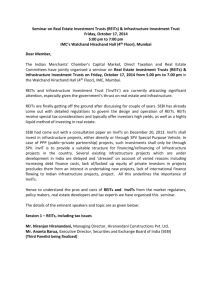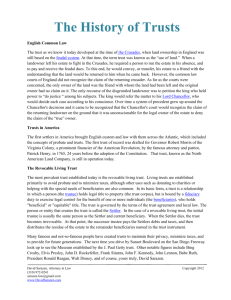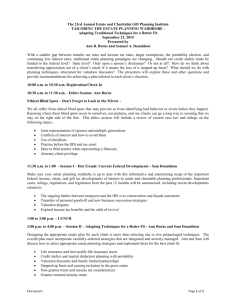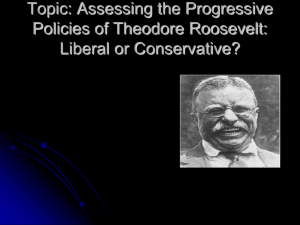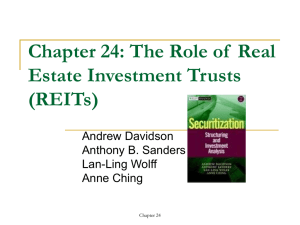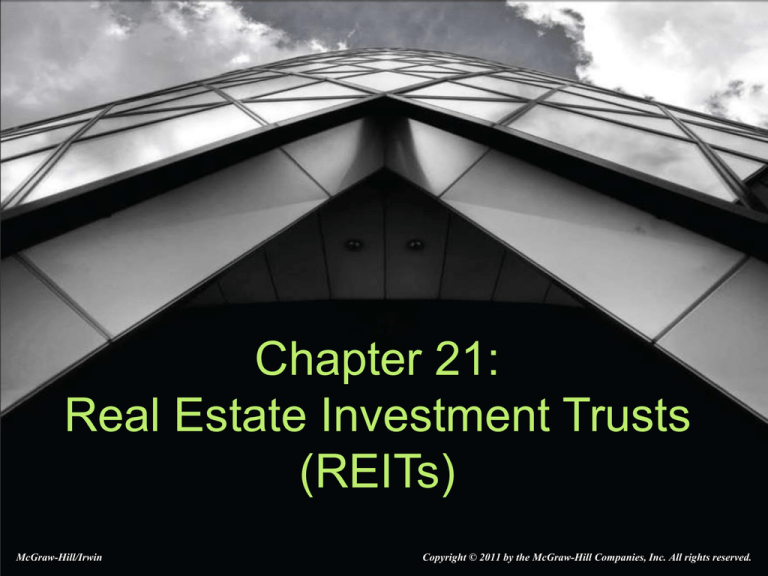
Chapter 21:
Real Estate Investment Trusts
(REITs)
McGraw-Hill/Irwin
Copyright © 2011 by the McGraw-Hill Companies, Inc. All rights reserved.
Real Estate Investment Trusts
Creation of the Internal Revenue Code
Pass-through entity: No corporate taxes
Asset requirements
– 75% test
Income requirements
Distribution requirements
– 90% rule
21-2
Real Estate Investment Trusts
Ownership requirements
– 100 person minimum
Pre-1986: Management Activity Restriction
1986 Tax Reform Act relaxed the
restriction and led to vertically integrated
operating companies
1991 Kimco Realty Offering
Taubman Realty Offering
– Umbrella Partnership REIT (“UPREIT”)
21-3
Real Estate Investment Trusts
Tax treatment
– Accelerated depreciation
– 40-Year asset life
– REIT dividends
Taxed as ordinary income
1999 Real Estate Modernization Act
– “Usual and customary” provision of services.
This was especially beneficial to REITs that
owned hotels.
– Taxable REIT subsidiaries
21-4
Exhibit 21-1
21-5
Real Estate Investment Trusts
Equity trusts
– Specializations
Property type
Trust duration
– Investment appeal
Diversified portfolio
Liquidity
21-6
Real Estate Investment Trusts
Equity trusts
– Investment appeal
Mutual funds
Exchange traded funds
International REITs
Closed-end funds
21-7
Real Estate Investment Trusts
Equity trusts
– Caveats
Purchase of original property not arm’s length
Conflicts of interest
– Safeguards
Appraisals
Sarbanes-Oxley
21-8
Real Estate Investment Trusts
Private REITs
– Targeted to institutional investors
– Syndicated to investors
– Incubator REITs
Mortgage REITs
– Mortgage REITs have come back into favor
again. The last time Mortgage REITs were
popular was in the 1970’s.
Hybrid REITs
21-9
Real Estate Investment Trusts
Funds from Operations (FFO)
– REIT equivalent to earnings per share
– Depreciation impact
Adjusted Funds from Operations (AFFO)
Funds Available for Distribution/Cash
Available for Distribution (FAD/CAD)
– FAD/CAD is the amount of actual cash that is
left over.
21-10
Real Estate Investment Trusts
Expansion & Growth
– Little Free Cash Flow
Income distribution rules
– Secondary Stock Offering
Dilution vs. accretion
– Debt Financing
21-11
Real Estate Investment Trusts
Growing income
– Existing properties
Rental income
Redevelopment
– Acquisitions
Purchase properties with cash at positive spreads.
Swap shares for property interests.
21-12
Real Estate Investment Trusts
Growing income
– Development
– Provision of services
Property management, brokerage, development,
etc.
– Financial engineering
Improve financing terms and lower capital costs.
21-13
Real Estate Investment Trusts
Additional issues
– Tenant improvements & free rent
– Leasing commissions & costs
– Straight-line rents
– Income from managing other properties
– Types of mortgage debt
– Ground leases
21-14
Real Estate Investment Trusts
Additional issues
– Lease renewal options
– Occupancy numbers: occupied vs. leased
space
– Retail REITs: Sales per square foot
– Costs of being a public company
Sarbanes-Oxley
21-15
Real Estate Investment Trusts
Mortgage REITs
– Does not own real property. Does own
mortgage paper.
21-16

